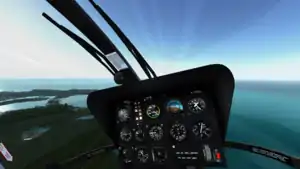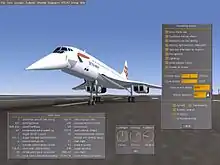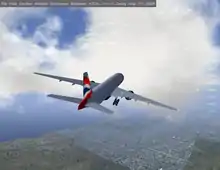FlightGear
FlightGear Flight Simulator (often shortened to FlightGear or FGFS) is a free, open source multi-platform flight simulator developed by the FlightGear project since 1997.[4]
 | |
 Bo105 over Saint Marteen | |
| Original author(s) | David Murr, Curt Olson, Michael Basler, Eric Korpela[1] |
|---|---|
| Developer(s) | FlightGear developers & contributors |
| Initial release | July 17, 1997 |
| Stable release | 2020.3.6[2]
/ 24 January 2021 |
| Repository | |
| Written in | C++, C[3] |
| Engine |
|
| Operating system | 32-bit & 64-bit Windows Linux macOS FreeBSD Solaris or IRIX |
| Platform | Cross-platform |
| Size | 1.54 GB (Main files) |
| Available in | English (Translations available) |
| Type | Flight simulator |
| License | GNU General Public License |
| Website | www |
David Murr started the project on April 8, 1996. The project had its first release in 1997 and continued in development. It has specific builds for a variety of operating systems including Microsoft Windows, macOS, Linux, IRIX, and Solaris.
Gameplay
Flight model

Mass balance, ground reactions, propulsion, aerodynamics, buoyant forces, external forces, atmospheric forces, and gravitational forces can be utilized by JSBSim, the current default flight model supported by FlightGear, to determine flight characteristics.[5] FlightGear also supports LaRCsim, UIUC, YASim, the use of an external source like MATLAB, and custom flight models for hot air balloons and spacecraft.[6]
Multiplayer
Several networking options allow FlightGear to communicate with other instances of FlightGear. A multiplayer protocol is available for using FlightGear on a local network in a multi aircraft environment. This can be used for formation flight or air traffic control simulation. Soon after the original Multiplayer Protocol became available, it was expanded to allow playing over the internet. It is possible to see other players in game if they have the same aircraft models and viewing their flight path is possible with the game's online multiplayer map.[7]
Several instances of FlightGear can be synchronized to allow for a multi-monitor environment.
Weather

FlightGear uses metar data to produce live weather patterns in real time.[8] Detailed weather settings allow for 3d clouds, a variety of cloud types, and precipitation. Precipitation and terrain affect turbulence and cloud formations.[9] Aloft waypoint settings allow high altitude behaviors of wind to be modeled from live weather information, and thermals can also be modeled.[10]
Development
FlightGear started as an online proposal in 1996 by David Murr, in the United States. He proposed a new flight simulator developed by volunteers over the Internet as alternative to proprietary, available simulators like the Microsoft Flight Simulator. The flight simulator was created using custom 3D graphics code. Development of an OpenGL based version was spearheaded by Curtis Olson starting in 1997. FlightGear incorporated other open-source resources, including the LaRCsim flight model from NASA, and freely available elevation data. The first working binaries using OpenGL came out in 1997. Flightgear's source code is released under the terms of the GNU General Public License and is free and open-source software.
Critical reception
Although not developed or typically analyzed solely as a game in the traditional sense, FlightGear has nevertheless undergone reviews in a number of online and offline publications, and received positive reviews as a flight simulator game.[11] FlightGear 1.0.0 was noted as being impressive for a game over a decade in the making, with a wide variety of aircraft and features.
PC Magazine noted how it is designed to be easy to add new aircraft and scenery.[12] Linux Format reviewed version 2.0 and rated it 8/10.[13]
Controversy
In June 2014 Honda lawyers issued a takedown request in which it was claimed that the HondaJet model in the simulator infringes on Honda's trademarks. Subsequently, HondaJet became the first model removed from the simulator due to legal reasons.[14]
Games journalist Tim Stone, in his simulation column The Flare Path, criticized the practice of third-parties attempting to profit from the work of community volunteers to the project, pointing to deceptive practices of stealing media available online from other sims to misrepresent VirtualPilot3d, as well as highlighting allegedly fake customer testimonials.[15] Following up in 2018, Tim Stone wrote a second column in which he again criticized the "ethical standards" and "extraordinary willingness to lie in the pursuit of sales" displayed by the advertisements.[16]
Applications and usages
FlightGear has been used in a range of projects in academia and industry (including NASA).[17] The application has also been used for pilot training and as a research and development platform by various agencies and universities.
Commercial redistribution
The simulator has been used by numerous institutes and companies, such as NASA/Ames Human Centered System Lab.[18][19] Pragolet s.r.o. [20] and the Endless Runway Project; a consortium of several European aerospace institutes.[21][22]
Companies
- MathWorks FlightGear to Simulink interface.[23]
- NASA/Ames Human Centered System Lab - 737NG full scale cockpit simulator.[24][25]
- Pragolet s.r.o. for light and ultra-light sports aircraft.[26]
- PAL-V Europe NV[27]
- Max Planck Institute for Biological Cybernetics, Germany, HeliLab[28] and MPI CyberMotion Simulator[29]
- Institute for Scientific Research[30]
Endless Runway Project
Endless Runway Project, consortium of several European aerospace institutes.[31][32]
Africa
- Minia University, Egypt[33]
Asia
- The Department of Aircraft and Aeroengine from the Chinese Air Force Engineering University[34]
- Nanjing University of Aeronautics and Astronautics, China[35]
- Shenyang Institute of Automation, China[36]
Australia
- RMIT University, Melbourne, Australia[37]
Europe
- Institute of Aerospace Engineering at the RWTH Aachen[38]
- University of Naples, Italy[39]
- University of Wales Intelligent Robotics Group, Aberystwyth, UK[40]
- Delft University of Technology, the Netherlands[41][42][43][44]
- Hamburg University of Applied Sciences, Germany[45]
- Technical University of Munich[46]
- Czech Technical University in Prague[47][48]
- French Aerospace Lab (ONERA) and University of Toulouse, France[49]
- Pázmány Péter Catholic University and the Hungarian Academy of Sciences[50]
- University of Sheffield, England[51]
- Supaéro[52]
- Durham University, England[53]
North America
- University of Tennessee, Chattanooga, USA[54]
- Northeastern University, Boston, USA[55]
- Arizona State University, USA[56]
- The Center for Coastal & Ocean Mapping/Joint Hydrographic Center at the University of New Hampshire, USA[57]
- University of Michigan, USA[58]
- University of Toronto Institute for Aerospace Studies, Canada[59][60]
- Purdue University, Indiana, USA[61]
- University of Arizona, USA[62]
South America
- National Technological University, Haedo, Argentina[63]
- Universidade Federal de Minas Gerais, Brazil[64]
See also
References
- "FlightGear–Flight Simulator". Archived from the original on October 14, 2011. Retrieved June 27, 2007.
- https://sourceforge.net/projects/flightgear/files/release-2020.3/; retrieved: 26 January 2021.
- "FlightGear source analyses". Ohloh. Archived from the original on February 6, 2009. Retrieved April 24, 2011.
- Barr, Joe (December 4, 2006). "FlightGear takes off". linux.com. Retrieved May 12, 2020.
- "JSBSim - FlightGear wiki". wiki.flightgear.org. Retrieved July 23, 2019.
- "Flight Dynamics Model - FlightGear wiki". wiki.flightgear.org. Retrieved July 23, 2019.
- "FlightGear μ - The MultiPlayer Map". mpmap03.flightgear.org. Retrieved July 23, 2019.
- "Weather reports - FlightGear wiki". wiki.flightgear.org. Retrieved July 23, 2019.
- "The art of cloud and weather rendering – FlightGear Flight Simulator". Retrieved July 23, 2019.
- "Weather - FlightGear wiki". wiki.flightgear.org. Retrieved July 23, 2019.
- "Review". Flight Sim. Archived from the original on February 28, 2010.
- Smith, Tim (September 1, 2006). "FlightGear 0.9.10". PC Magazine (UK). Archived from the original on September 27, 2007. Retrieved June 29, 2007.
- Linux_Format_132_June_2010
- Ernesto (June 3, 2014). "Honda Takes Down "Infringing" Jet From FlightGear". TorrentFreak. Archived from the original on June 6, 2014. Retrieved June 4, 2014.
- Stone, Tim (August 24, 2012). "The Flare Path: Don't Buy VirtualPilot3D". Rock, Paper, Shotgun. Retrieved August 17, 2020.
- Stone, Tim (March 9, 2018). "Don't Buy ProFlightSimulator". Rock, Paper, Shotgun. Retrieved August 17, 2020.
- "Applications for the Simulator". usenix.org. Archived from the original on November 13, 2007. Retrieved September 3, 2007.
- "LFS Technologies". Archived from the original on April 10, 2016. Retrieved February 7, 2019.
- Human Centered System Labs, NASA
- Thöndel, Evžen (January 29, 2009). "Simulator of a Light and Ultra-Light Sport Aircraft". Pragolet. Archived from the original on January 12, 2011. Retrieved June 12, 2017.
- "Aircraft aspects of the Endless Runway" (PDF). September 30, 2013. Archived (PDF) from the original on April 16, 2014. Retrieved January 16, 2014.
- "endlessrunway-project.eu". Archived from the original on June 5, 2017. Retrieved June 12, 2017.
- <Aerospace Blockset Archived June 16, 2010, at the Wayback Machine
- "LFS Technologies". Archived from the original on April 10, 2016. Retrieved February 7, 2019.
- Human Centered System Labs, NASA
- Thöndel, Evžen (January 29, 2009). "Simulator of a Light and Ultra-Light Sport Aircraft". Pragolet. Archived from the original on January 12, 2011. Retrieved June 12, 2017.
- "The PAL-V simulator". Archived from the original on January 13, 2017. Retrieved June 12, 2017.
- "HeliLab (Tiled Display)". Archived from the original on April 16, 2014. Retrieved June 12, 2017.
- "Der MPI-CyberMotion-Simulator". Archived from the original on April 21, 2017. Retrieved June 12, 2017.
- Eric F. Sorton, Sonny Hammaker (September 2005). "Simulated Flight Testing of an Autonomous Unmanned Aerial Vehicle Using FlightGear" (PDF).
- "Aircraft aspects of the Endless Runway" (PDF). September 30, 2013. Archived (PDF) from the original on April 16, 2014. Retrieved January 16, 2014.
- "endlessrunway-project.eu". Archived from the original on June 5, 2017. Retrieved June 12, 2017.
- "Automatic control education using FlightGear and MATLAB based virtual lab". May 2012.
- XU Haojun, LIU Dongliang, XUE Yuan, ZHOU Li, MIN Guilong (January 12, 2012). "Airworthiness Compliance Verification Method Based on Simulation of Complex System" (PDF). Chinese Journal of Aeronautics.CS1 maint: multiple names: authors list (link)
- "3D simulation of A-SMGCS surface movement based on FlightGear". May 16, 2012. Archived from the original on October 20, 2017. Retrieved June 12, 2017.
- Chong Wu, Juntong Qi, Dalei Song, Jianda Han (May 24, 2013). "LP Based Path Planning for Autonomous Landing of An Unmanned Helicopter on A Moving Platform". Journal of Unmanned System Technology. Archived from the original on February 28, 2014. Retrieved June 12, 2017.CS1 maint: multiple names: authors list (link)
- Thorpe, Dylan (April 2007). "Modelling and Control of Tethered Kite Systems for Wind Energy Extraction" (PDF). Archived (PDF) from the original on September 9, 2015. Retrieved June 12, 2017.
- "Archived copy". Archived from the original on April 3, 2010. Retrieved June 12, 2017.CS1 maint: archived copy as title (link)
- Domenico P. Coiro; Agostino De Marco; Fabrizio Nicolosi (2007). "A 6DOF Flight Simulation Environment for General Aviation Aircraft with Control Loading Reproduction" (PDF). Archived (PDF) from the original on April 16, 2014. Retrieved June 12, 2017.
- Aerobot Research Archived February 9, 2014, at the Wayback Machine, Dave Barne
- Ehlert, Patrick (January 18, 2005). "The Intelligent Cockpit Environment (ICE) Project". TU Delft. Archived from the original on April 16, 2014. Retrieved June 12, 2017.
- Ehlert P.A.M., Mouthaan Q.M., Rothkrantz L.J.M. (November 2002). "Recognising situations in a flight simulator environment" (PDF). SCS Publishing House. Archived (PDF) from the original on July 5, 2017. Retrieved April 18, 2012.CS1 maint: multiple names: authors list (link)
- Datcu Dragos (January 2003). "The ICE Project". Archived from the original on September 8, 2004. Retrieved May 8, 2012.
- "SIMONA". Archived from the original on February 23, 2017. Retrieved June 12, 2017.
- Caja R., Scholz D. (November 23, 2012). "Box Wing Flight Dynamics in the Stage of Conceptual Aircraft Design" (PDF). Archived (PDF) from the original on August 9, 2017. Retrieved June 12, 2017.
- "Mach mit ! - daedalus". Archived from the original on June 6, 2017. Retrieved June 12, 2017.
- at YouTube
- "Archived copy". Archived from the original on September 19, 2015. Retrieved June 12, 2017.CS1 maint: archived copy as title (link)
- Dehais, Frédéric (June 21, 2004). "Modélisation des conflits dans l'activité de pilotage" (PDF) (in French). University of Toulouse. Archived (PDF) from the original on July 14, 2012. Retrieved June 12, 2017.
- "Collision avoidance for UAV using visual detection" (PDF). Archived (PDF) from the original on August 1, 2014. Retrieved June 12, 2017.
- "Modelling and Autonomous Flight Simulation of a Small Unmanned Aerial Vehicle" (PDF). August 2006. Archived from the original (PDF) on April 16, 2014. Retrieved June 12, 2017.
- "Aerodynamics MOOC using FlightGear". February 2015. Archived from the original on September 10, 2015. Retrieved June 12, 2017.
- Alan Purvis; Ben Morris; Richard McWilliam (2015). "FlightGear as a tool for real time fault-injection, detection and self-repair" (PDF). Durham Research Online. Archived (PDF) from the original on July 19, 2018. Retrieved June 12, 2017.
- Ellis, Dawn. "University of Tennessee at Chattanooga". FlightGear. Archived from the original on June 14, 2012. Retrieved April 18, 2012.
- "A brainy innovation takes flight". Northeastern University. May 31, 2011. Archived from the original on January 14, 2012. Retrieved June 12, 2017.
- Arizona State Tries Practice over Theory in Engineering Education Archived September 9, 2015, at the Wayback Machine, Campus Technology
- "Spatially Aware Hand-held Devices and the Boat Simulator". Archived from the original on August 23, 2012. Retrieved October 20, 2012.
- Duncan Miller (2011). "Autonomous Vehicle Laboratory for Sense and Avoid Research and Hardware-in-the-Loop Simulations" (PDF). American Institute of Aeronautics and Astronautics. Archived (PDF) from the original on January 28, 2012. Retrieved June 12, 2017.
- Project Ornithopter (2006). "Flying the Ornithopter in FlightGear Flight Simulator". Archived from the original on April 28, 2017. Retrieved June 12, 2017.
- "Human-powered ornithopter becomes first ever to achieve sustained flight". University of Toronto. September 22, 2010. Archived from the original on March 4, 2016. Retrieved June 12, 2017.
- "Cyber Attack Vulnerabilities Analysis for Unmanned Aerial Vehicles" (PDF). Archived from the original (PDF) on April 16, 2014. Retrieved June 12, 2017.
- Umashankar, Rohit (April 30, 2013). "Thermal Energy Extraction Methods for UAV Gliders". Archived from the original on November 28, 2015. Retrieved June 12, 2017.
- "Archived copy". Archived from the original on June 9, 2013. Retrieved June 12, 2017.CS1 maint: archived copy as title (link)
- "Analise Comparativa Entre Microsoft Flight Simulator E Flightgear Flight Simulator Em Testes Hardware-In-The-Loop" (PDF).
External links
| Wikimedia Commons has media related to FlightGear. |